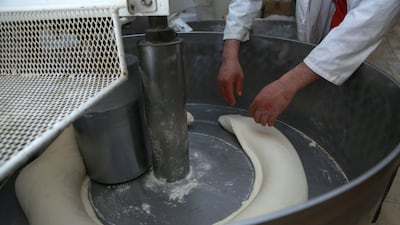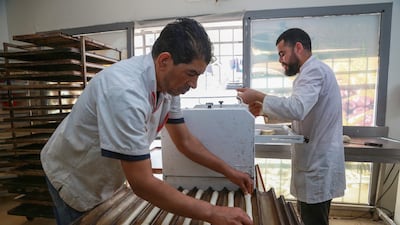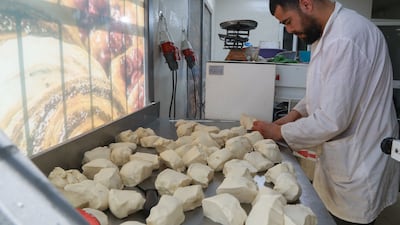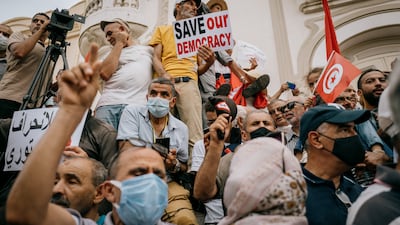For years, members of Tunisia's dysfunctional and much-reviled Parliament were more likely to come to blows than consensus. Even as President Kais Saied locked them out of a job, froze their salaries and benefits, and placed them on a no-fly list last summer in a bid to steer the country on his own, MPs were divided over his actions and intentions.
Yet on March 30, more than eight months after the body last met in a quorum, 121 MPs gathered virtually and, in short order, voted to nullify Mr Saied's exceptional measures and all decrees he had issued since taking sole control of the country last July.
The vote, an effort pulled together through peer-to-peer meetings across party and ideological lines over the course of months, marks a profound ideological shift among many of the body's 217 members as they begin to mount what they say is an urgent campaign to face an existential threat to the democratic system and the country they serve.
"There was a sense of danger that brought us together," said Ghazi Chaouachi, secretary general of the centre-left Attayar Al Demokrati party.
The source of that sense of danger, MPs from four parties told The National, was President Saied.
The big shift
"When Kais Saied took control on July 25, there were a group of us who considered it a blessing," said Walid Jalled, an MP with the centrist Tahya Tounes party. "There was a real blockage in Parliament, problems between its leadership and the executive, and nothing was getting done."
Mr Jalled himself welcomed what was meant to be a 30-day pause, and joined a group of 28 MPs who approached Mr Saied looking for dialogue they said was not happening in a Parliament riddled with distrust and partisan politics. But the president, an outsider without a party who relies on a small circle of advisers to help him shape policy, refused a meeting.
"Kais Saied never believed in the parliamentary system," Mr Jalled said, "and he began to turn up his rhetoric to demonise all of the representatives as corrupt actors".
Still, Mr Jalled and others, including some members of Mr Chaouachi's party, refrained from criticising the president while they waited to see what course he would chart.
As the months wore on and Mr Saied took more and more unusual actions — appointing a Cabinet without a parliamentary vote, suspending large parts of the constitution, trying civilians in military court, announcing a constitutional referendum, and in January dissolving the country's High Judicial Council, all while unable to resolve the country's growing economic crisis — "we understood we were in real trouble," Mr Jalled said.
"We came to the realisation that the president is not shaken by the street, parties, foreign actors, the economic situation or anything else," said Mr Chaouachi. "Despite all this he kept going forward with his own project" to write a new constitution.
The shift among parliamentarians mirrors a shift in the larger populace, whose confidence in the president has been shaken as prices climb and corruption continues largely unabated, despite his calls to clean up society. Attempts to negotiate an emergency loan package with the IMF have failed and shortages of basic goods are widespread.
Shortly after the new year, Mr Chaouachi and some of his party members began speaking with MPs in other parties whom they knew shared their concerns, and proposed a virtual session to push back against the president.
Meetings were had and messages were exchanged outside traditional party structures, in coffee shops and over WhatsApp, as the MPs worked to ensure they'd have at least 109 members present for a quorum — and that any legislation they put forward would be passed.
"The initiation for the session came from outside the traditional majority," said Ahmed Gaaloul, a close adviser to Parliament Speaker Rached Ghannouchi, who leads the Islamist Ennahda party.
"It took a few weeks to agree on the makeup of the session, on the motion and the text of the declaration, but it was quite consensual work."
The Speaker takes a seat
One of the main sticking points among the MPs planning to meet was Mr Ghannouchi himself. The Ennahda leader, divisive even among his own party members, had developed a reputation as perhaps Tunisia's most reviled politician. Many refused to participate in the session were he to lead it, fearing his toxic image could undermine their work.
Private polling data shared with several major parties, including Ennahda, confirmed that suspicion. While public confidence and trust in Mr Saied had dropped dramatically, his popularity remained relatively high among voters, a sign that they were still exasperated with the old political regime.
"People just haven't been mobilising to defend parliament," said Monica Marks, an assistant professor of Middle East politics at New York University Abu Dhabi and a Tunisia expert. "Almost any invocation of the old parliament as something worthy of defending will be met with sardonic laughter and snide stares among a lot of Tunisians."
Mr Gaaloul said the Speaker understood this. "Mr Ghannouchi discussed this with his executive bureau and convinced the majority of his parliamentary group" — including members from Qalb Tounes and Al Karama, the two other parties in the governing coalition — "that the priority was a return to democracy".
"His stance was, 'If me stepping back will help get those who disagree with me to stand up for democracy, then there is no problem.'"
The virtual session was instead led by Tarek Ftiti, an independent MP from the interior region of Kairouan, who swiftly brought the motion to nullify Mr Saied's exceptional measures and decrees to a vote.
Within hours, Mr Saied struck back, dissolving the Parliament — a move he had only days earlier said he was forbidden from taking under the constitution — and calling for MPs to be interrogated on terrorism charges. Seven MPs, including Mr Ghannouchi, were interrogated in the days after the meeting, and pressure has mounted from the president for the judiciary to bring charges against a number of MPs.
Beyond the political battlefield
For Mr Chaouachi, the president's outsized response was precisely the result he envisioned when Attayar proposed the session — a "shock strategy" that would put pressure on the president to take more drastic actions that might unsettle the country or international community.
But not all the MPs in attendance shared the same goal. Oussama Khlifi of the centre-right Qalb Tounes said his party's aim was to "put parliament back to work for the people", a view shared by their coalition partners Ennahda.
For Ms Marks, the Tunisia expert, the session was a first step in what she sees as a long and painful political and social road ahead.
"This will be remembered in the history books as the moment when Tunisia's democratically elected parliament stood up for itself against dictatorial aims," she said. "But tactically speaking, parliament has a lot of big questions to answer right now and they're not easy questions."
Chief among those is how to right Tunisia's rapidly capsizing economy, a crisis all parties know needs a solution but for which few have clear ideas or policy proposals.
A second virtual session, dedicated to social and economic issues, was postponed after several MPs were brought to face court charges, making it difficult to secure a quorum.
"Even if this level of organisation continues and they start focusing more on social economic issues," said Ms Marks, "they still have an uphill battle to fight, as Mr Saied is playing so insistently on Tunisians' disillusionment with political party leadership and with the former parliament."
Still the urgency to get the political machine back on track, potentially with newfound co-operation and consensus, to deliver for everyday Tunisians pulses through each MP as they work. They know it is the only way they — and their system of government — will survive.
“Tunisian people are pragmatic," said Mr Chaouachi. "When hunger strikes, they'll eat their rulers.”
In-demand jobs and monthly salaries
- Technology expert in robotics and automation: Dh20,000 to Dh40,000
- Energy engineer: Dh25,000 to Dh30,000
- Production engineer: Dh30,000 to Dh40,000
- Data-driven supply chain management professional: Dh30,000 to Dh50,000
- HR leader: Dh40,000 to Dh60,000
- Engineering leader: Dh30,000 to Dh55,000
- Project manager: Dh55,000 to Dh65,000
- Senior reservoir engineer: Dh40,000 to Dh55,000
- Senior drilling engineer: Dh38,000 to Dh46,000
- Senior process engineer: Dh28,000 to Dh38,000
- Senior maintenance engineer: Dh22,000 to Dh34,000
- Field engineer: Dh6,500 to Dh7,500
- Field supervisor: Dh9,000 to Dh12,000
- Field operator: Dh5,000 to Dh7,000
Results
5pm Maiden (PA) Dh80,000 1,400m
Winner No Riesgo Al Maury, Szczepan Mazur (jockey), Ibrahim Al Hadhrami (trainer)
5.30pm Handicap (PA) Dh80,000 1,600m
Winner Marwa W’Rsan, Sam Hitchcott, Jaci Wickham.
6pm Handicap (PA) Dh80,000 1,600m
Winner Dahess D’Arabie, Al Moatasem Al Balushi, Helal Al Alawi.
6.30pm Handicap (PA) Dh80,000 2,200m
Winner Safin Al Reef, Connor Beasley, Abdallah Al Hammadi.
7pm Wathba Stallions Cup Handicap (PA) Dh70,000 2,200m
Winner Thulbaseera Al Jasra, Shakir Al Balushi, Ibrahim Al Hadhrami.
7.30pm Maiden (TB) Dh 80,000 2,200m
Winner Autumn Pride, Szczepan Mazur, Helal Al Alawi.
Company%20profile
%3Cp%3E%3Cstrong%3EName%3A%20%3C%2Fstrong%3EEmonovo%20(previously%20Marj3)%0D%3Cbr%3E%3Cstrong%3EBased%3A%20%3C%2Fstrong%3ECairo%0D%3Cbr%3E%3Cstrong%3ELaunch%20year%3A%20%3C%2Fstrong%3E2016%0D%3Cbr%3E%3Cstrong%3ENumber%20of%20employees%3A%20%3C%2Fstrong%3E12%0D%3Cbr%3E%3Cstrong%3ESector%3A%20%3C%2Fstrong%3Eeducation%20technology%0D%3Cbr%3E%3Cstrong%3EFunding%3A%20%3C%2Fstrong%3Ethree%20rounds%2C%20undisclosed%20amount%3C%2Fp%3E%0A
ENGLAND TEAM
England (15-1)
George Furbank; Jonny May, Manu Tuilagi, Owen Farrell (capt), Elliot Daly; George Ford, Ben Youngs; Tom Curry, Sam Underhill, Courtney Lawes; Charlie Ewels, Maro Itoje; Kyle Sinckler, Jamie George, Joe Marler
Replacements: Luke Cowan-Dickie, Ellis Genge, Will Stuart, George Kruis, Lewis Ludlam, Willi Heinz, Ollie Devoto, Jonathan Joseph
Groom and Two Brides
Director: Elie Semaan
Starring: Abdullah Boushehri, Laila Abdallah, Lulwa Almulla
Rating: 3/5
PROFILE OF SWVL
Started: April 2017
Founders: Mostafa Kandil, Ahmed Sabbah and Mahmoud Nouh
Based: Cairo, Egypt
Sector: transport
Size: 450 employees
Investment: approximately $80 million
Investors include: Dubai’s Beco Capital, US’s Endeavor Catalyst, China’s MSA, Egypt’s Sawari Ventures, Sweden’s Vostok New Ventures, Property Finder CEO Michael Lahyani
More from Rashmee Roshan Lall
The specs
Engine: 2.4-litre 4-cylinder
Transmission: CVT auto
Power: 181bhp
Torque: 244Nm
Price: Dh122,900
How to help
Send “thenational” to the following numbers or call the hotline on: 0502955999
2289 – Dh10
2252 – Dh 50
6025 – Dh20
6027 – Dh 100
6026 – Dh 200
The years Ramadan fell in May
UAE currency: the story behind the money in your pockets
12%20restaurants%20opening%20at%20the%20hotel%20this%20month
%3Cp%3EAriana%E2%80%99s%20Persian%20Kitchen%3Cbr%3EDinner%20by%20Heston%20Blumenthal%3Cbr%3EEstiatorio%20Milos%3Cbr%3EHouse%20of%20Desserts%3Cbr%3EJaleo%20by%20Jose%20Andres%3Cbr%3ELa%20Mar%3Cbr%3ELing%20Ling%3Cbr%3ELittle%20Venice%20Cake%20Company%3Cbr%3EMalibu%2090265%3Cbr%3ENobu%20by%20the%20Beach%3Cbr%3EResonance%20by%20Heston%20Blumenthal%3Cbr%3EThe%20Royal%20Tearoom%C2%A0%3C%2Fp%3E%0A
Anxiety and work stress major factors
Anxiety, work stress and social isolation are all factors in the recogised rise in mental health problems.
A study UAE Ministry of Health researchers published in the summer also cited struggles with weight and illnesses as major contributors.
Its authors analysed a dozen separate UAE studies between 2007 and 2017. Prevalence was often higher in university students, women and in people on low incomes.
One showed 28 per cent of female students at a Dubai university reported symptoms linked to depression. Another in Al Ain found 22.2 per cent of students had depressive symptoms - five times the global average.
It said the country has made strides to address mental health problems but said: “Our review highlights the overall prevalence of depressive symptoms and depression, which may long have been overlooked."
Prof Samir Al Adawi, of the department of behavioural medicine at Sultan Qaboos University in Oman, who was not involved in the study but is a recognised expert in the Gulf, said how mental health is discussed varies significantly between cultures and nationalities.
“The problem we have in the Gulf is the cross-cultural differences and how people articulate emotional distress," said Prof Al Adawi.
“Someone will say that I have physical complaints rather than emotional complaints. This is the major problem with any discussion around depression."
Daniel Bardsley
PRISCILLA
%3Cp%3EDirector%3A%20Sofia%20Coppola%3C%2Fp%3E%0A%3Cp%3EStarring%3A%20Cailee%20Spaeny%2C%20Jacob%20Elordi%3C%2Fp%3E%0A%3Cp%3ERating%3A%203%2F5%3C%2Fp%3E%0A
The%20specs
%3Cp%3E%3Cstrong%3EEngine%3A%3C%2Fstrong%3E%201.5-litre%204-cylinder%3Cbr%3E%3Cstrong%3ETransmission%3A%20%3C%2Fstrong%3ECVT%3Cbr%3E%3Cstrong%3EPower%3A%20%3C%2Fstrong%3E119bhp%3Cbr%3E%3Cstrong%3ETorque%3A%20%3C%2Fstrong%3E145Nm%3Cbr%3E%3Cstrong%3EPrice%3A%20%3C%2Fstrong%3EDh%2C89%2C900%20(%2424%2C230)%3Cbr%3E%3Cstrong%3EOn%20sale%3A%20%3C%2Fstrong%3Enow%3C%2Fp%3E%0A
Hotel Silence
Auður Ava Ólafsdóttir
Pushkin Press
Specs
Engine: Electric motor generating 54.2kWh (Cooper SE and Aceman SE), 64.6kW (Countryman All4 SE)
Power: 218hp (Cooper and Aceman), 313hp (Countryman)
Torque: 330Nm (Cooper and Aceman), 494Nm (Countryman)
On sale: Now
Price: From Dh158,000 (Cooper), Dh168,000 (Aceman), Dh190,000 (Countryman)
COMPANY PROFILE
Founders: Alhaan Ahmed, Alyina Ahmed and Maximo Tettamanzi
Total funding: Self funded
Lexus LX700h specs
Engine: 3.4-litre twin-turbo V6 plus supplementary electric motor
Power: 464hp at 5,200rpm
Torque: 790Nm from 2,000-3,600rpm
Transmission: 10-speed auto
Fuel consumption: 11.7L/100km
On sale: Now
Price: From Dh590,000
Wicked: For Good
Director: Jon M Chu
Starring: Ariana Grande, Cynthia Erivo, Jonathan Bailey, Jeff Goldblum, Michelle Yeoh, Ethan Slater
Rating: 4/5
MATCH INFO
Barcelona v Real Madrid, 11pm UAE
Match is on BeIN Sports
Specs
Engine: 51.5kW electric motor
Range: 400km
Power: 134bhp
Torque: 175Nm
Price: From Dh98,800
Available: Now
Ovo's tips to find extra heat
- Open your curtains when it’s sunny
- Keep your oven open after cooking
- Have a cuddle with pets and loved ones to help stay cosy
- Eat ginger but avoid chilli as it makes you sweat
- Put on extra layers
- Do a few star jumps
- Avoid alcohol
Mohammed bin Zayed Majlis
England Test squad
Joe Root (captain), Moeen Ali, James Anderson, Jonny Bairstow (wicketkeeper), Stuart Broad, Jos Buttler, Alastair Cook, Sam Curran, Keaton Jennings, Dawid Malan, Jamie Porter, Adil Rashid, Ben Stokes.
Dolittle
Director: Stephen Gaghan
Stars: Robert Downey Jr, Michael Sheen
One-and-a-half out of five stars
SPEC%20SHEET%3A%20APPLE%20IPAD%20PRO%20(12.9%22%2C%202022)
%3Cp%3E%3Cstrong%3EDisplay%3A%3C%2Fstrong%3E%2012.9-inch%20Liquid%20Retina%20XDR%2C%202%2C732%20x%202%2C048%2C%20264ppi%2C%20wide%20colour%2C%20True%20Tone%2C%20ProMotion%2C%201%2C600%20nits%20max%2C%20Apple%20Pencil%20hover%3C%2Fp%3E%0A%3Cp%3E%3Cstrong%3EChip%3A%3C%2Fstrong%3E%20Apple%20M2%2C%208-core%20CPU%2C%2010-core%20GPU%2C%2016-core%20Neural%20Engine%3C%2Fp%3E%0A%3Cp%3E%3Cstrong%3EMemory%3A%3C%2Fstrong%3E%20Storage%20%E2%80%93%20128GB%2F256GB%2F512GB%20%2F%201TB%2F2TB%3B%20RAM%20%E2%80%93%208GB%2F16GB%3C%2Fp%3E%0A%3Cp%3E%3Cstrong%3EPlatform%3A%3C%2Fstrong%3E%20iPadOS%2016%3C%2Fp%3E%0A%3Cp%3E%3Cstrong%3EMain%20camera%3A%3C%2Fstrong%3E%20Dual%2012MP%20wide%20(f%2F1.8)%20%2B%2010MP%20ultra-wide%20(f%2F2.4)%2C%202x%20optical%2F5x%20digital%2C%20Smart%20HDR%204%3C%2Fp%3E%0A%3Cp%3E%3Cstrong%3EVideo%3A%3C%2Fstrong%3E%20ProRes%204K%20%40%2030fps%2C%204K%20%40%2024%2F25%2F30%2F60fps%2C%20full%20HD%20%40%2025%2F30%2F60fps%2C%20slo-mo%20%40%20120%2F240fps%3C%2Fp%3E%0A%3Cp%3E%3Cstrong%3EFront%20camera%3A%3C%2Fstrong%3E%20TrueDepth%2012MP%20ultra-wide%20(f%2F2.4)%2C%202x%2C%20Smart%20HDR%204%2C%20Centre%20Stage%2C%20Portrait%2C%20Animoji%2C%20Memoji%3B%20full%20HD%20%40%2025%2F30%2F60fps%3C%2Fp%3E%0A%3Cp%3E%3Cstrong%3EAudio%3A%3C%2Fstrong%3E%20Four-speaker%20stereo%3C%2Fp%3E%0A%3Cp%3E%3Cstrong%3EBiometrics%3A%3C%2Fstrong%3E%20Face%20ID%2C%20Touch%20ID%3C%2Fp%3E%0A%3Cp%3E%3Cstrong%3EI%2FO%3A%3C%2Fstrong%3E%20USB-C%2C%20smart%20connector%20(for%20folio%2Fkeyboard)%3C%2Fp%3E%0A%3Cp%3E%3Cstrong%3EBattery%3A%3C%2Fstrong%3E%20Up%20to%2010%20hours%20on%20Wi-Fi%3B%20up%20to%20nine%20hours%20on%20cellular%3C%2Fp%3E%0A%3Cp%3E%3Cstrong%3EFinish%3A%3C%2Fstrong%3E%20Silver%2C%20space%20grey%3C%2Fp%3E%0A%3Cp%3E%3Cstrong%3EIn%20the%20box%3A%3C%2Fstrong%3E%20iPad%2C%20USB-C-to-USB-C%20cable%2C%2020-watt%20power%20adapter%3C%2Fp%3E%0A%3Cp%3E%3Cstrong%3EPrice%3A%3C%2Fstrong%3E%20WiFi%20%E2%80%93%20Dh4%2C599%20(128GB)%20%2F%20Dh4%2C999%20(256GB)%20%2F%20Dh5%2C799%20(512GB)%20%2F%20Dh7%2C399%20(1TB)%20%2F%20Dh8%2C999%20(2TB)%3B%20cellular%20%E2%80%93%20Dh5%2C199%20%2F%20Dh5%2C599%20%2F%20Dh6%2C399%20%2F%20Dh7%2C999%20%2F%20Dh9%2C599%3C%2Fp%3E%0A
COMPANY%20PROFILE
%3Cp%3E%3Cstrong%3EDate%20started%3A%3C%2Fstrong%3E%202020%3Cbr%3E%3Cstrong%3EFounders%3A%3C%2Fstrong%3E%20Khaldoon%20Bushnaq%20and%20Tariq%20Seksek%3Cbr%3E%3Cstrong%3EBased%3A%3C%2Fstrong%3E%20Abu%20Dhabi%20Global%20Market%3Cbr%3E%3Cstrong%3ESector%3A%3C%2Fstrong%3E%20HealthTech%3Cbr%3E%3Cstrong%3ENumber%20of%20staff%3A%3C%2Fstrong%3E%20100%3Cbr%3E%3Cstrong%3EFunding%20to%20date%3A%3C%2Fstrong%3E%20%2415%20million%3C%2Fp%3E%0A
Switching%20sides
%3Cp%3EMahika%20Gaur%20is%20the%20latest%20Dubai-raised%20athlete%20to%20attain%20top%20honours%20with%20another%20country.%0D%3C%2Fp%3E%0A%3Cp%3E%3Cstrong%3EVelimir%20Stjepanovic%20(Serbia%2C%20swimming)%20%3C%2Fstrong%3E%0D%3Cbr%3EBorn%20in%20Abu%20Dhabi%20and%20raised%20in%20Dubai%2C%20he%20finished%20sixth%20in%20the%20final%20of%20the%202012%20Olympic%20Games%20in%20London%20in%20the%20200m%20butterfly%20final.%20%0D%3C%2Fp%3E%0A%3Cp%3E%3Cstrong%3EJonny%20Macdonald%20(Scotland%2C%20rugby%20union)%20%3C%2Fstrong%3E%0D%3Cbr%3EBrought%20up%20in%20Abu%20Dhabi%20and%20represented%20the%20region%20in%20international%20rugby.%20When%20the%20Arabian%20Gulf%20team%20was%20broken%20up%20into%20its%20constituent%20nations%2C%20he%20opted%20to%20play%20for%20Scotland%20instead%2C%20and%20went%20to%20the%20Hong%20Kong%20Sevens.%20%0D%3C%2Fp%3E%0A%3Cp%3E%3Cstrong%3ESophie%20Shams%20(England%2C%20rugby%20union)%20%3C%2Fstrong%3E%0D%3Cbr%3EThe%20daughter%20of%20an%20English%20mother%20and%20Emirati%20father%2C%20Shams%20excelled%20at%20rugby%20in%20Dubai%2C%20then%20after%20attending%20university%20in%20the%20UK%20played%20for%20England%20at%20sevens.%20%0D%3C%2Fp%3E%0A
What is a robo-adviser?
Robo-advisers use an online sign-up process to gauge an investor’s risk tolerance by feeding information such as their age, income, saving goals and investment history into an algorithm, which then assigns them an investment portfolio, ranging from more conservative to higher risk ones.
These portfolios are made up of exchange traded funds (ETFs) with exposure to indices such as US and global equities, fixed-income products like bonds, though exposure to real estate, commodity ETFs or gold is also possible.
Investing in ETFs allows robo-advisers to offer fees far lower than traditional investments, such as actively managed mutual funds bought through a bank or broker. Investors can buy ETFs directly via a brokerage, but with robo-advisers they benefit from investment portfolios matched to their risk tolerance as well as being user friendly.
Many robo-advisers charge what are called wrap fees, meaning there are no additional fees such as subscription or withdrawal fees, success fees or fees for rebalancing.














